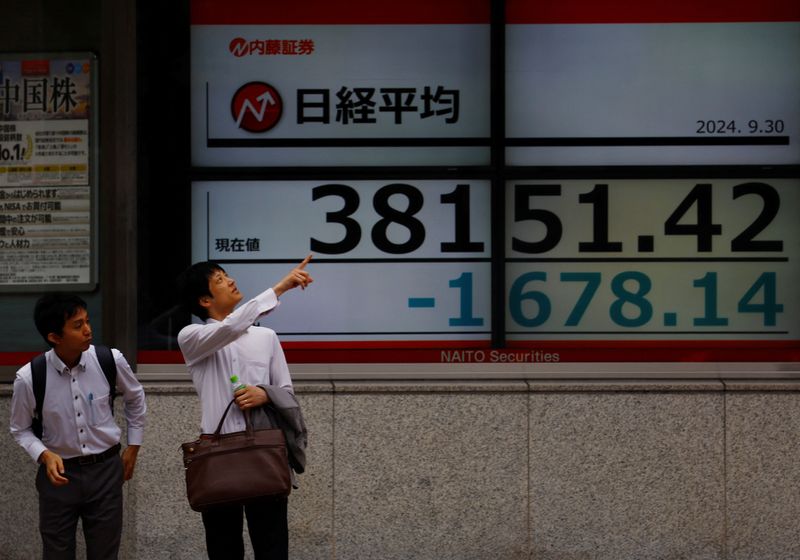By Kevin Buckland
TOKYO (Reuters) – Asia shares sank on Wednesday, catching up with the sell-off on Wall Avenue after Iran’s ballistic missile strike on Israel provoked fears of a wider regional battle, whereas pushed greater on the chance of provide disruptions.
Buyers flocked to safer belongings, pushing U.S. Treasury bond yields down in Asian time, whereas gold hovered close to an all-time excessive.
The safe-haven greenback traded near its strongest in three weeks versus the euro. Macroeconomics additionally buoyed the greenback, with a resilient U.S. job market arguing for a smaller Federal Reserve interest-rate reduce in November, and euro zone inflation traits backing a European Central Financial institution easing this month.
slumped 1.5% as of 0022 GMT, whereas South Korea’s dropped 1.3% and Australia’s benchmark misplaced 0.3%.
MSCI’s broadest index of Asia-Pacific shares slipped about 0.5%.
Hong Kong’s had but to open after a vacation on Tuesday. Mainland Chinese language markets are shut for the week-long Golden Week vacation. Buying and selling in Taiwan was suspended resulting from a storm.
U.S. inventory index futures weakened 0.16%, after the money index misplaced 0.9% in a single day.
“In the chain of potential market volatility shocks, geopolitics will typically trump economics, corporate earnings, or a central bank response – largely because most market players are poor at pricing risk around these events,” stated Chris Weston, head of analysis at Pepperstone.
“While these events typically reconcile in a market positive fashion, the tail risk it can throw up is clearly significant,” Weston stated. “The situation remains fluid, and the slightest calming or increased aggression in the rhetoric from Israel or Iran could result in a sizeable impact on sentiment in markets.”
Iran stated early on Wednesday that its missile assault on Israel was completed barring additional provocation, though Israel and the U.S. promised retaliation.
futures gained greater than 1% to $74.33 per barrel, extending the two.5% advance from Tuesday. U.S. WTI futures gained 1.3% to $70.73 per barrel, after Tuesday’s 2.4% rally.
Gold eased 0.16% to $2,658.63 per ounce, following a greater than 1% soar within the earlier session that introduced it near final month’s file excessive at $2,685.42.
Benchmark 10-year Treasury yields ticked down 1.5 foundation factors (bps) to three.7278%.
The , which tracks the U.S. foreign money versus the euro and 5 different main rivals, was regular at 101.21 after pushing as excessive as 101.39 on Tuesday for the primary time since Sept. 19.
Europe’s shared foreign money was little modified at $1.1070 following a 0.6% drop within the earlier session, when it dipped to $1.1046 for the primary time since Sept. 12.
Euro space knowledge on Tuesday confirmed inflation fell beneath the ECB’s 2% goal final month, bolstering bets for a quarter-point fee reduce on Oct. 17.
In the meantime, U.S. figures in a single day confirmed a strong economic system, a day after Fed Chair Jerome Powell pushed again in opposition to the chance of one other 50 foundation level fee reduce when the U.S. central financial institution meets subsequent month.
Job openings unexpectedly elevated in August after two straight month-to-month decreases, however hiring was smooth and in step with a slowing labour market.

Non-public payrolls knowledge is due afterward Wednesday, forward of doubtless essential month-to-month non-farm payrolls numbers on Friday.
U.S. politics can even be in focus, as Democrat Tim Walz and Republican JD (NASDAQ:) Vance go face to face in a vice-presidential debate on Wednesday.




